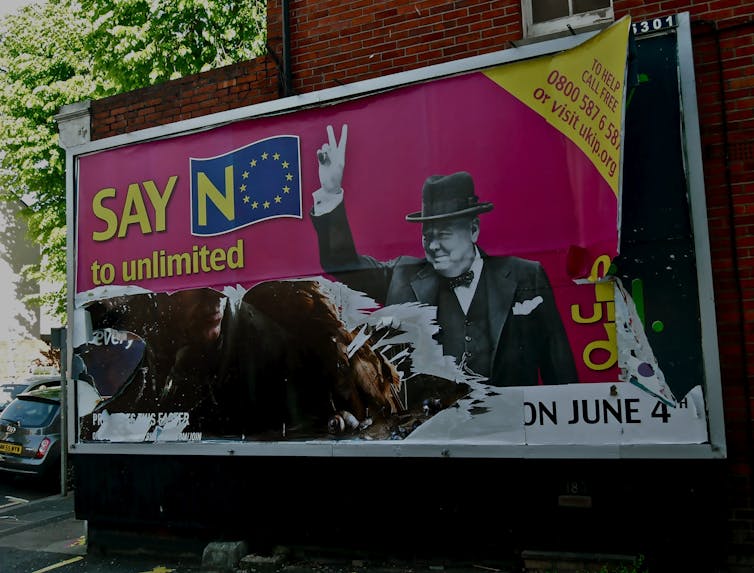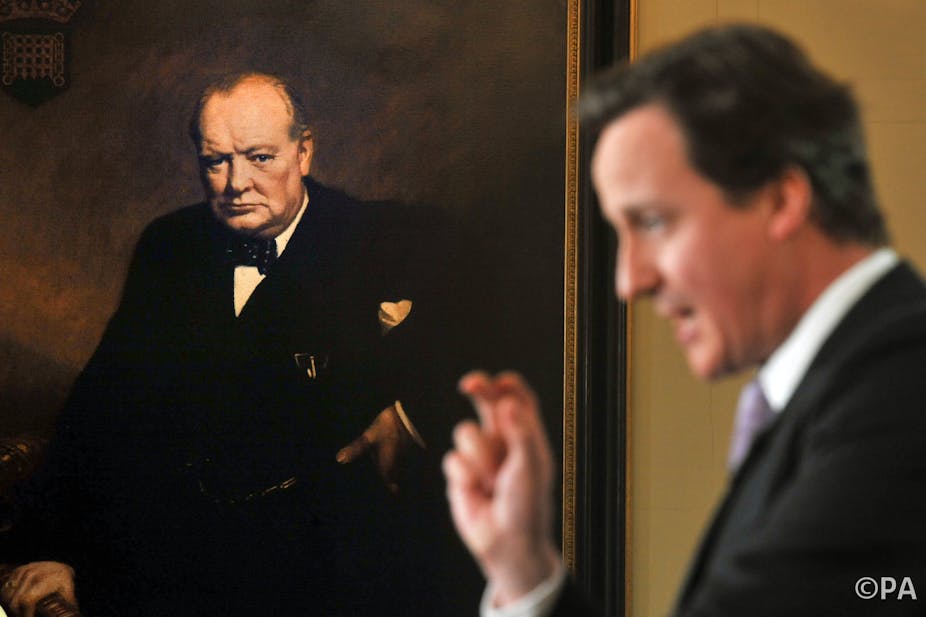Winston Churchill’s role in fostering European unity is beyond dispute in Brussels. The European Union’s website lists Churchill as one of 11 founding fathers of the organisation. In Strasbourg, the European parliament boasts a Winston Churchill Building in honour of his legacy for European cooperation. Yet, in his native Britain, Churchill’s views on Europe are a cause of controversy.
It has long been this way. In 1996, the former Conservative prime minister Edward Heath took Tory Eurosceptics to task for claiming Churchill counted among their number. As debate about Britain’s place in Europe has become more acrimonious, attempts by both sides to claim Churchill’s posthumous support have become more vocal, sometimes brazen.
Will the real Churchill please stand up
In 2009, UKIP courted controversy by depicting Churchill next to the words: “Say No to European Union” on its European election posters. In 2012, the Council of the EU drew almost as much ire for using a recording of Churchill’s 1946 Zurich speech, in which he declared: “We must build a kind of United States of Europe”, to open its video marking the EU’s receipt of the Nobel Peace Prize.
Since then, the war of words has intensified. In late 2013, the EU Commission president José Manuel Barroso, urged Britain, to embrace Churchill’s vision of a “United States of Europe”, prompting UKIP leader Nigel Farage to accuse Barroso of misrepresenting Churchill as a supporter of European political union.
Even the esteemed professor, Vernon Bogdanor, was caught in the crossfire after suggesting on Radio 4 that Churchill was open to the idea of Britain joining a United States of Europe. On hearing the broadcast, Conservative MP John Redwood demanded the BBC “apologise and publish a correction”.
With Europe, but not of it?
This use of his name for political posturing would have horrified Churchill, not just as a statesman but as an historian. Many claims about Churchill’s views on Europe, particularly those advanced by eurosceptics, quote selectively from his post-war speeches.

Worse, there is a frequent tendency to mis-attribute Churchill’s declaration that: “We are with Europe, but not of it” to one or other of these speeches. In actual fact, these words date from a Saturday Evening Post article Churchill wrote in 1930, in which he also first advanced his support for the idea of a “United States of Europe”.
A two-speed Europe?
Despite more careful consideration of the evidence, historians have also been divided on Churchill’s position. Yet, it is undeniable that Churchill envisaged Britain playing a role in European unification, albeit not in the same way as France or Germany. To Churchill, Britain occupied a unique position in the world order, at the centre of “three majestic circles”: the British Commonwealth and Empire, the wider English-speaking world and a United Europe. For Britain, developing a closer relationship to Europe demanded accommodation with its two other “special relationships”.
While cautious about British involvement, Churchill was alert to the risk of Britain being left behind. Speaking in July 1951 he warned of “disadvantages and even dangers to us in standing aloof”, expressing regret that Britain had not joined discussions about establishing a European army (an initiative he had proposed in Strasbourg the year before). He also underlined his hope that Britain would join the European Coal and Steel Community.
Churchill did not share the preoccupations of today’s eurosceptics with national sovereignty. He disassociated himself from European federalists, but stressed some form of political unity would be required. He did not shrink from addressing the implications should Britain opt to participate. As leader of the opposition in the Commons in 1950, he indicated that both the Liberals and the Conservatives were “prepared to consider, and if convinced to accept, the abrogation of national sovereignty, provided that we are satisfied with the conditions and the safeguards”. It is impossible to imagine a Tory leader saying this today.
Deeds not words
Churchill was largely silent on the subject of Britain’s place in Europe after resigning as prime minister in 1955. He was still an MP when the Treaty of Rome was signed in 1957, creating the European Economic Community, and when Britain made its first, unsuccessful, application to join it in 1961. He witnessed the accelerating decline of Britain’s Empire after the 1956 Suez crisis, but did not once rise to speak once in Commons debates on these, or any other, matters before standing down in 1964.
Yet, Churchill’s actions spoke louder than his lack of words. When Eden resigned as prime minister in 1957, the Queen consulted Churchill on a successor. He recommended Macmillan, a leading pro-European. Similarly, he took every opportunity to support the career of Edward Heath, who was ultimately to take Britain into the EEC in 1972.
Conservative eurosceptics may find it hard to accept, but Churchill would never have joined their ranks. Instead, his broadly pro-European stance was adopted by Conservative leaders from Macmillan to Major. Indeed, in his current quandary about how to negotiate the terms of Britain’s membership, David Cameron would do well to return to Churchill’s words for inspiration. As Churchill said in 1957:
We genuinely wish to join a European free trade area – and if our continental friends wish to reach agreement, I am quite sure a way can be found and that reasonable adjustments can be made to meet the essential interests of all.

